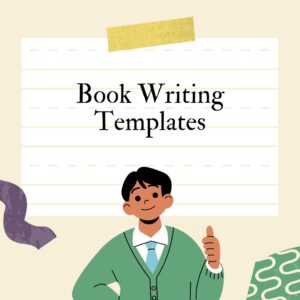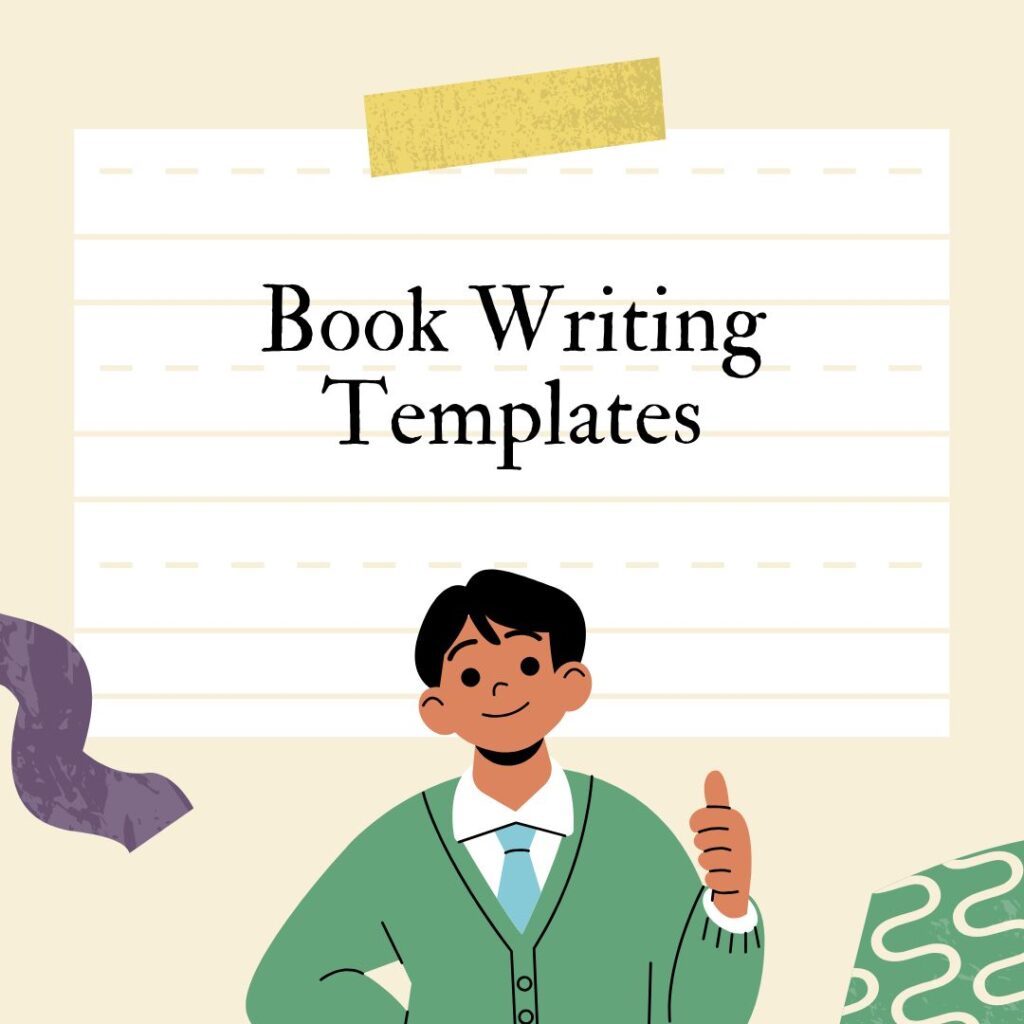Book Writing Templates: Writers Secret Process
Writing a book can be a daunting task, but utilizing book writing templates can significantly simplify the process. Templates provide structure, guidance, and a framework that helps writers organize their thoughts and ideas effectively. In this comprehensive guide, we will explore the various types of book writing templates available, how to use them, and tips for creating your own. Whether you are a seasoned author or a novice writer, these templates will serve as invaluable tools in your writing journey.

Table of Contents
What are Book Writing Templates?
Bookwriting templates are pre-designed frameworks that help writers organize their ideas and structure their narratives. These templates can take various forms, including outlines, character sketches, plot diagrams, and formatting guidelines. They serve as a roadmap for writers, guiding them through the writing process from conception to completion.
Benefits of Using Book Writing Templates
Using book writing templates offers several advantages:
- Organization: Templates help writers organize their thoughts and ideas systematically, making it easier to develop a coherent narrative.
- Time-Saving: By providing a structured framework, templates reduce the time spent on planning and allow writers to focus on the actual writing process.
- Clarity: Templates clarify the elements of storytelling, such as character development and plot progression, ensuring that key components are not overlooked.
- Consistency: Utilizing templates promotes consistency in style and format throughout the manuscript.
- Creativity: While templates provide structure, they also encourage creativity by allowing writers to fill in the details within a defined framework.
Types of Book Writing Templates
There are various types of book writing templates that cater to different aspects of the writing process:
3.1 Outline Templates
Outline templates help writers organize their ideas into a structured format before diving into the actual writing. They can include sections for chapters, key plot points, character arcs, and themes.Example Outline Template:
- Chapter Title
- Main Idea
- Key Events
- Character Development
- Themes
3.2 Character Development Templates
Character development templates assist writers in fleshing out their characters by detailing their backgrounds, motivations, relationships, and growth throughout the story.Example Character Development Template:
- Character Name:
- Age:
- Background:
- Personality Traits:
- Goals:
- Conflicts:
- Relationships:
3.3 Plot Development Templates
Plot development templates guide writers through the various stages of their story, helping them establish conflicts, resolutions, and character journeys.Example Plot Development Template:
- Exposition:
- Rising Action:
- Climax:
- Falling Action:
- Resolution:
3.4 Scene Templates
Scene templates provide a structured approach to writing individual scenes by outlining the purpose, setting, characters involved, and key events.Example Scene Template:
- Scene Title:
- Purpose of Scene:
- Setting:
- Characters Present:
- Key Events:
3.5 Worldbuilding Templates
For genres like fantasy or science fiction, worldbuilding templates help authors create detailed settings by outlining geography, cultures, politics, and history.Example Worldbuilding Template:
- Name of World/Setting:
- Geography:
- Inhabitants/Cultures:
- History/Timeline:
3.6 Manuscript Formatting Templates
Manuscript formatting templates ensure that your manuscript adheres to industry standards for submission to agents or publishers.Example Manuscript Formatting Guidelines:
- Font: Times New Roman or Arial
- Font Size: 12pt
- Line Spacing: Double-spaced
- Margins: 1 inch on all sides
How to Use Book Writing Templates Effectively
To maximize the benefits of book writing templates:
- Choose the Right Template: Select templates that align with your specific writing needs—whether it’s outlining your plot or developing your characters.
- Customize as Needed: Feel free to modify templates to suit your unique style or project requirements; they should serve as guides rather than rigid structures.
- Stay Flexible: While templates provide structure, don’t hesitate to deviate from them if inspiration strikes or if your story takes an unexpected turn.
- Use Multiple Templates: Combine different types of templates (e.g., outline and character development) for a more comprehensive approach to your writing project.
- Review and Revise: Regularly revisit your completed templates throughout the writing process to ensure consistency and coherence in your narrative.
Creating Your Own Book Writing Template
If existing templates don’t meet your needs, consider creating your own:
- Identify Your Needs: Determine what aspects of your writing process require structure (e.g., character arcs or plot development).
- Outline Key Elements: List the essential components you want to include in your template based on your specific project requirements.
- Design Your Format: Choose how you want to organize information (e.g., tables, bullet points) for clarity and ease of use.
- Test Your Template: Use it while working on a project; adjust as necessary based on its effectiveness in guiding your writing process.
Common Mistakes to Avoid When Using Templates
While using book writing templates can be beneficial, there are common pitfalls to watch out for:
- Over-Reliance on Templates: Relying too heavily on templates can stifle creativity; use them as guides rather than strict rules.
- Neglecting Originality: Ensure that while using templates, you maintain your unique voice and style in storytelling.
- Ignoring Flexibility: Be open to changing elements within the template as your story evolves; rigidity can hinder creativity.
- Skipping Important Details: Don’t overlook significant aspects just because they aren’t included in the template; always consider what’s essential for your narrative.
Examples of Effective Book Writing Templates
Here are some resources where you can find effective book writing templates:
- Reedsy’s Book Development Template: This template helps you define characters and plot structure.
- Self-Publishing School’s Free Fiction & Nonfiction Templates: Offers organized structures for both fiction and nonfiction projects.
- KDP Free Paperback Manuscript Templates: Provides layout options for authors publishing through Kindle Direct Publishing.
- Evernote’s Creative Writing Templates: A variety of plotting methods that help outline novels effectively.
- DIYBookFormats Free Manuscript Layouts: Offers minimalistic layouts suitable for various programs including Word.
FAQs
What are book writing templates?
Book writing templates are structured frameworks that help writers organize their ideas, characters, plots, and scenes. They provide guidance on how to format and develop various aspects of a manuscript, making the writing process more efficient.
Why should I use book writing templates?
Using book writing templates can save time, enhance organization, and improve clarity in your writing. They help ensure that key elements of storytelling are not overlooked and can guide you through the writing process from start to finish.
What types of book writing templates are available?
Common types of book writing templates include:
- Outline templates
- Character development templates
- Plot development templates
- Scene templates
- Worldbuilding templates
- Manuscript formatting templates
How do I choose the right template for my project?
Consider the specific needs of your project. If you’re focusing on character development, use a character template. For overall structure, an outline template may be more appropriate. Assess what aspects of your writing require the most organization.
Can I customize a book writing template?
Absolutely! Templates are meant to be flexible tools. Feel free to modify them to suit your unique style, project requirements, or personal preferences.
How can I create my own book writing template?
To create your own template:
- Identify what elements you need for your writing process.
- Outline the key components you want to include.
- Decide on the format (e.g., bullet points or tables).
- Test it out while working on a project and adjust as necessary.
Are there any common mistakes to avoid when using templates?
Yes, common mistakes include:
- Over-relying on templates without allowing for creativity.
- Neglecting originality and personal voice.
- Ignoring flexibility within the template as your story evolves.
- Skipping important details that may not be included in the template.
Where can I find free book writing templates?
You can find free book writing templates on various websites, including:
- Reedsy
- Self-Publishing School
- KDP (Kindle Direct Publishing)
- Evernote
- DIYBookFormats
Do I need to use a template for every writing project?
No, using a template is not mandatory for every project. While they can be helpful, some writers prefer to work without them or may only use certain types of templates depending on the specific needs of their project.
How do book writing templates improve my writing process?
Templates improve your writing process by providing structure and organization, helping you focus on developing your narrative without getting lost in details or overwhelmed by the complexity of storytelling.
Conclusion
Book writing templates are invaluable tools that can streamline your writing process and enhance productivity while maintaining creative integrity. By understanding different types of templates—such as outlines, character development sheets, plot structures, scene breakdowns, worldbuilding guides, and formatting standards—you can approach your writing projects with confidence and clarity.As you embark on your next writing journey in 2025 and beyond, remember that utilizing these resources will not only save time but also help you craft compelling narratives that resonate with readers! Happy writing!
Discover marketing services, interviews & publishing tools at SharingStories.



